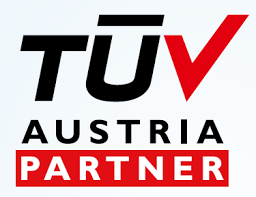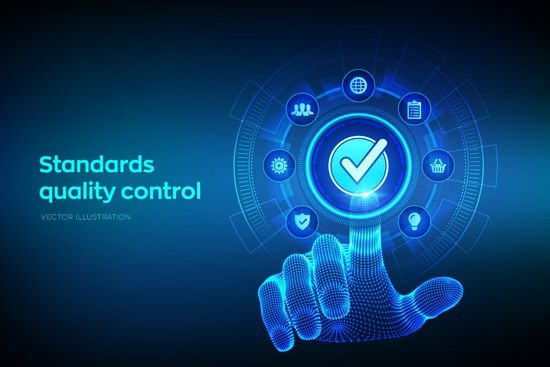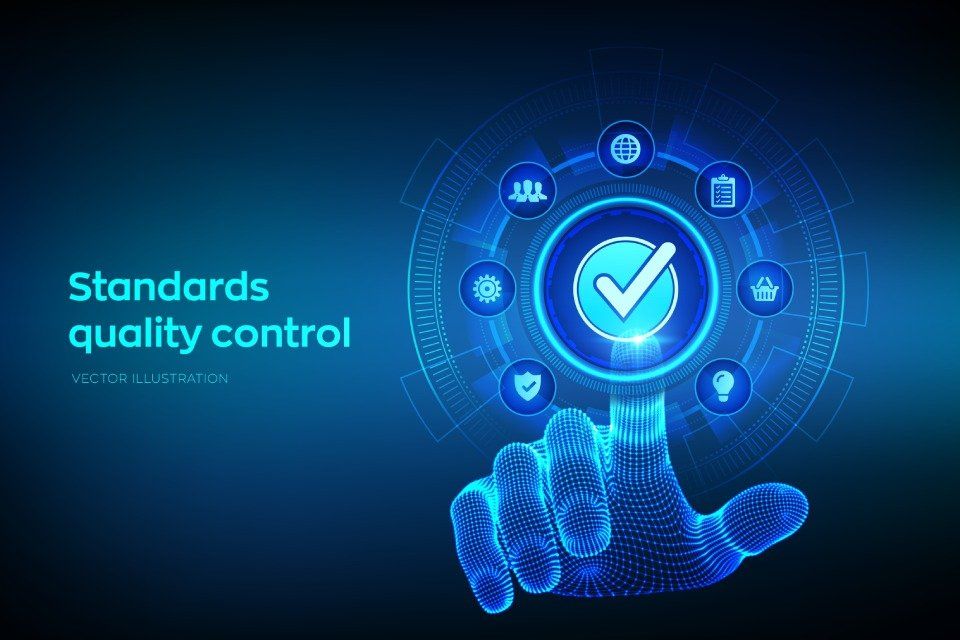management systems: what they are and what they are for
Management systems for companies are sets of rules and procedures that an organization can adopt to certify and apply in order to achieve defined objectives, such as:
- customer satisfaction;
- the continuous improvement of the services it offers;
- the ability to demonstrate to third parties (i.e. customers or potential customers, control bodies, suppliers or other subjects external to the company), the ability to organize itself well, to continuously maintain its commitments and always satisfy requests of customers.
At the Rinas Welding School in Bagheria, we hold not only technical courses, but also courses relating to management systems for companies: contact us for information, quotes or to register.

VOLUNTARY SYSTEMS CERTIFICATION
The adoption of one or more management systems for companies is voluntary. The objective is usually to implement tools that allow the company to keep its processes and activities under control, and at the same time to show the quality of the work to all stakeholders.

Slide title
Write your caption hereButton
AMONG THE MOST FAMOUS EXISTING MANAGEMENT SYSTEMS, POSSIBLY
“CERTIFICABLE”
I'M NOT A BIG SLEEP 9001
Contains the requirements for designing, implementing and maintaining a quality system over time;
Guide specifically designed to offer the quality requirements for welding and melting metallic materials.
I'M NOT A BIG SLEEP 14001
International standard with voluntary compliance, applicable to any type of public or private organisation, which specifies the requirements of an environmental management system.
UNI ISO 45001
The ISO 45001:2018 standard replaces the previous BS OHSAS 18001 from 12 March 2018. BS OHSAS 18001 will no longer be valid from 12 March 2021.
UNI EN 1090
The UNI EN 1090 certification is a mandatory certification starting from July 2014 for all manufacturers of structural steel components andlluminio, as well as for manufacturers of kits placed on the market as a construction product.
The ability of a company to produce material that meets all the qualitative characteristics required by the UNI EN 1090 part 1, 2 and 3 standards is certified by a third party called a certification body. This type of certification is recognized internationally.
-
The advantages of certifying your company UNI EN 1090?
Get widespread recognition through certification, thanks to its independence and impartiality characteristics;
-
For whom is it mandatory?
UNI EN 1090 certification concerns manufacturers of steel or aluminum structures, such as metal carpentry, which are obliged (starting from 1 July 2014) to bear the CE marking according to the UNI EN 1090-1 standard.

Slide title
Write your caption hereButton
I'M NOT A BIG SLEEP 9001
ISO 9001 Quality Management System Certification
The ISO 9001 "Quality management systems - Requirements" standard is the most famous and widespread standard for quality improvement. It is the standard chosen by all those organizations that intend to equip themselves with a work tool aimed at continuous and constant improvement, that want to increase their efficiency, reduce costs, and increase customer loyalty.
A company with an ISO 9001 certified quality system is a company that offers the guarantee of a solid structure, evaluated by an independent body, organized in such a way as to keep all aspects of its activity under control and guarantee reproducibility of the performance and therefore the maintenance but also the continuous improvement of the quality standards provided.
-
The ISO 9001 Standard
Based on seven quality management principles, ISO 9001 does not explain how to set up the management model from a quality point of view, but has the aim of encouraging companies to understand what objectives they want to achieve and how to achieve them by using the best own resources:
-
The advantages of ISO 9001 certification
ISO 9001 certification helps organizations develop and improve their performance, as well as demonstrate high levels of service quality to potential customers. It offers greater visibility and transparency towards the reference markets, and is often requested as a prerequisite or preferential requirement during tenders. It allows greater cost control, reduction of waste, increased productivity and effectiveness of internal processes, with the consequent reduction of inefficiencies. Increases the ability to satisfy the needs and expectations of its customers through better knowledge and control of the company.
-
An ISO 9001 certified company is a company that:
has established an adequate quality management system for its products and processes
Among the various international certifications used in the industrial sector there is also Iso 3834, also known as Uni En Iso 3834, a guide specifically designed to offer the quality requirements for welding and casting of metallic materials. It is therefore a welding certification that is useful for workshops and construction sites, where it is important to ensure correct management of the manufacturing process, where welding plays a decisive role. This process must be controlled entirely, starting from the arrival of the materials in the workshop, obviously up to the final result, and the ISO 3834 standard certifies the correctness of this process in its entirety.
-
How ISO 3834 works
The standard defined by ISO 3834 defines the necessary requirements that manufacturers must satisfy to operate towards good manufacturing practice, implementing the production process with the improvements necessary to correct any critical issues recorded. For companies interested in welder certification established by the criteria of Uni 3834, it is necessary to contact a certifying body accredited by the Italian Organization Authorized by the European Welding Federation (EWF) and by the International Institute of Welding (IIW) for the issue of the aforementioned certification , concerning the aspects that involve both the quality of the welding process, as well as the safety and environmental aspects that are protected by the 3834 certification as well as by other certificates of the ISO regulation. The ISO 3834 standard has a transversal character across various production sectors, and finds its correct application in combination with other product standards, including:
-
What are the benefits of ISO 3834
For workshops and construction sites that complete the training course necessary to obtain ISO 3834 certification, the benefits are multiple: first of all for manufacturers it lies in the definition and maintenance of quality requirements for welding, which favor the definition of contracts and tenders which are established according to specific application criteria, following the guidelines for the checks and qualification of suppliers of welded products endorsed by ISO 3834. Guideline which also applies to quality management systems in the special welding process, for example integration of the Uni En Iso 9001 standard. Obviously Iso 3834 is useful in the context of European directives such as PED, CPD, Simple Containers. Finally, we remind you that this welding certification is mandatory for civil engineering works. Certified companies are included in the list on the website of the authorized training body and on that of the EWF, representing a further guarantee of benefits and job opportunities for companies operating in the sector.

Slide title
Write your caption hereButton
ISO 14001 is a voluntary international standard, applicable to any type of public or private organisation, which specifies the requirements of an environmental management system.
This standard, in addition to having the advantage of being easily integrated with other management systems compliant with specific standards (ISO 9001, BS OHSAS 18001, ISO 50001), is fully implemented in Annex II of the reg. 1221/09 (EMAS III).
-
key points
To define the management system compliant with ISO 14001 it is necessary:
-
ADVANTAGES
A certified environmental management system allows:
UNI ISO 45001
ISO 45001:2018 replaces the previous BS OHSAS 18001 with the aim of providing the standard with international regulatory recognition (ISO) and making integration with other ISO standards for Management Systems easier as it is based on the Annex structure SL which defines the common structure that all standards must respect.
The ISO 45001 standard requires organizations that decide to implement a Worker Health and Safety Management System to look beyond short-term issues, and to take into account what society in general expects from the organization itself in terms of responsibility. Organizations will therefore also have to think about their contractors and suppliers and the effects that their activities have on their interested parties (stakeholders).
-
Read more
As globalization and global trade grow, so does the expectation of ethical behavior from organizations in every aspect of their business, and in particular in attention to the health and safety of their employees. ISO 45001 offers organizations, in addition to an internationally recognized standard, the correct direction to formalize and structure risk management, the management of legislative compliance, the dissemination of safer working practices and the evaluation of safety performance and workers' health. The systemic approach facilitates the reduction of the number of incidents and business continuity.

Slide title
Write your caption hereButton
CONTACT US
Thanks for contacting us. We will reply to you as soon as possible.
An error occurred while sending the message. Please try again later.

Slide title
Write your caption hereButton
SITE
SS 113 km 248,600
90011 Bagheria (PA)
WORKING HOURS
- Mon - Fri
- -
- Sat - Sun
- Closed











